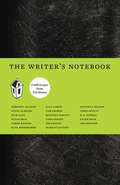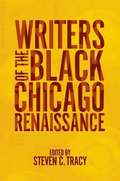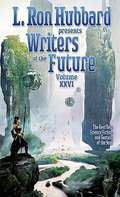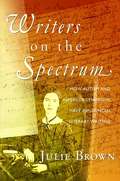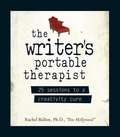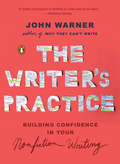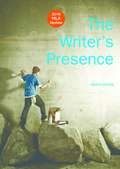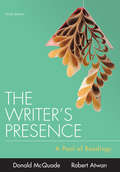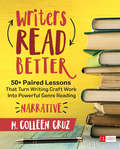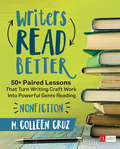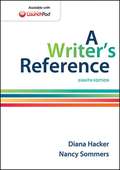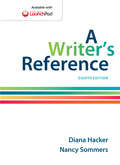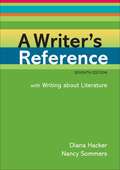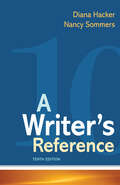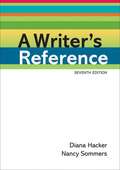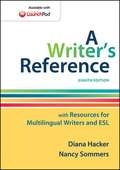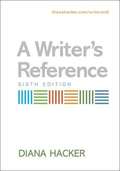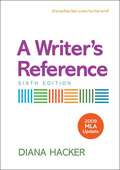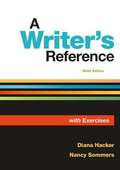- Table View
- List View
The Writer's Notebook II: Craft Essays from Tin House
by Christopher Beha Francine ProseThe Writer's Notebook II offers aspiring authors sixteen insightful essays about the craft of writing by Tin House authors and summer workshop faculty members, including Aimee Bender, Steve Almond, Maggie Nelson, Karen Russell, Benjamin Percy, and others. The Writer's Notebook II continues in the tradition of The Writer's Notebook, featuring essays based on craft seminars from the Tin House Summer Writer's Workshop, as well as a variety of craft essays from Tin House magazine contributors and Tin House Books authors. The collection includes essays that not only examine important craft aspects such as humor, suspense, and research but that also explore creating fractured and nonrealist narratives and the role of dream in fiction. An engaging and enlightening read, The Writer's Notebook II is both a toolkit and an inspiration for any writer. The Writer's Notebook II offers aspiring authors sixteen insightful essays about the craft of writing by Tin House authors and summer workshop faculty members, including Aimee Bender, Steve Almond, Maggie Nelson, Karen Russell, Benjamin Percy, and others.
The Writer's Notebook II
by Christopher Beha Francine ProseThe Writer's Notebook II continues in the tradition of The Writer's Notebook, featuring essays based on craft seminars from the Tin House Summer Writer's Workshop, as well as a variety of craft essays from Tin House magazine contributors and Tin House Books authors. The collection includes essays that not only examine important craft aspects such as humor, suspense, and research but that also explore creating fractured and nonrealist narratives and the role of dream in fiction. An engaging and enlightening read, The Writer's Notebook II is both a toolkit and an inspiration for any writer.
The Writer's Notebook II: Craft Essays from Tin House
by Francine Prose Christopher BehaThe Writer's Notebook II offers aspiring authors sixteen insightful essays about the craft of writing by Tin House authors and summer workshop faculty members, including Aimee Bender, Steve Almond, Maggie Nelson, Karen Russell, Benjamin Percy, and others. The Writer's Notebook II continues in the tradition of The Writer's Notebook, featuring essays based on craft seminars from the Tin House Summer Writer's Workshop, as well as a variety of craft essays from Tin House magazine contributors and Tin House Books authors. The collection includes essays that not only examine important craft aspects such as humor, suspense, and research but that also explore creating fractured and nonrealist narratives and the role of dream in fiction. An engaging and enlightening read, The Writer's Notebook II is both a toolkit and an inspiration for any writer. The Writer's Notebook II offers aspiring authors sixteen insightful essays about the craft of writing by Tin House authors and summer workshop faculty members, including Aimee Bender, Steve Almond, Maggie Nelson, Karen Russell, Benjamin Percy, and others.
The Writer's Notebook II: Craft Essays from Tin House
by Francine Prose Christopher BehaThe Writer's Notebook II offers aspiring authors sixteen insightful essays about the craft of writing by Tin House authors and summer workshop faculty members, including Aimee Bender, Steve Almond, Maggie Nelson, Karen Russell, Benjamin Percy, and others. The Writer's Notebook II continues in the tradition of The Writer's Notebook, featuring essays based on craft seminars from the Tin House Summer Writer's Workshop, as well as a variety of craft essays from Tin House magazine contributors and Tin House Books authors. The collection includes essays that not only examine important craft aspects such as humor, suspense, and research but that also explore creating fractured and nonrealist narratives and the role of dream in fiction. An engaging and enlightening read, The Writer's Notebook II is both a toolkit and an inspiration for any writer. The Writer's Notebook II offers aspiring authors sixteen insightful essays about the craft of writing by Tin House authors and summer workshop faculty members, including Aimee Bender, Steve Almond, Maggie Nelson, Karen Russell, Benjamin Percy, and others.
Writers of the Black Chicago Renaissance
by Steven C. TracyWriters of the Black Chicago Renaissance comprehensively explores the contours and content of the Black Chicago Renaissance, a creative movement that emerged from the crucible of rigid segregation in Chicago's "Black Belt" from the 1930s through the 1960s. Heavily influenced by the Harlem Renaissance and the Chicago Renaissance of white writers, its participants were invested in political activism and social change as much as literature, art, and aesthetics. The revolutionary writing of this era produced some of the first great accolades for African American literature and set up much of the important writing that came to fruition in the Black Arts Movement. The volume covers a vast collection of subjects, including many important writers such as Richard Wright, Gwendolyn Brooks, and Lorraine Hansberry as well as cultural products such as black newspapers, music, and theater. The book includes individual entries by experts on each subject; a discography and filmography that highlight important writers, musicians, films, and cultural presentations; and an introduction that relates the Harlem Renaissance, the white Chicago Renaissance, the black Chicago Renaissance, and the Black Arts Movement. Contributors are Robert Butler, Robert H. Cataliotti, Maryemma Graham, James C. Hall, James L. Hill, Michael Hill, Lovalerie King, Lawrence Jackson, Angelene Jamison-Hall, Keith Leonard, Lisbeth Lipari, Bill V. Mullen, Patrick Naick, William R. Nash, Charlene Regester, Kimberly Ruffin, Elizabeth Schultz, Joyce Hope Scott, James Smethurst, Kimberly M. Stanley, Kathryn Waddell Takara, Steven C. Tracy, Zoe Trodd, Alan Wald, Jamal Eric Watson, Donyel Hobbs Williams, Stephen Caldwell Wright, and Richard Yarborough.
Writers of the Future, Vol 26
by L. Ron Hubbard K. D. WentworthDiscover Imaginative New Worlds of Tomorrow. Discover the new visionaries of imagination in the Writers of the Future. Established in 1983 by L. Ron Hubbard expressly for the aspiring writer, Writers of the Future has become the most respected and significant forum for new talent in all aspects of speculative fiction. Never before published first-rate science fiction and fantasy stories selected by top names in the field. "Not only is the writing excellent...it is also extremely varied. There's a lot of hot new talent in it." --Locus Magazine
Writers on the Spectrum
by Julie BrownFrom Hans Christian Andersen's fairytale characters to Lewis Carroll's Wonderland and Emily Dickinson's poetic imagery, the writings and lives of some of the world's most celebrated authors indicate signs of autism and Asperger's Syndrome. Through analysis of biographies, autobiographies, letters and diaries, Professor Julie Brown identifies literary talents who display characteristics of Autistic Spectrum Disorder (ASD) and uncovers the similarities in their writing that suggest atypical, autistic brains. Providing close readings of authors' works, Brown explores writing processes, content, theme, structure and writing style to reveal the underlying autistic traits that have influenced their writing. The book provides an overview of ASD and common threads in autistic writing followed by an illuminating exploration of how these threads are evident in the literature of both well-known and lesser known authors. This groundbreaking study of autism in literature will be of interest to anyone with a professional or personal interest in literature or the autistic mind.
The Writer's Portable Therapist
by Rachel BallonIn this inspiring, instructive little volume, noted therapist, author, and perfect muse Rachel "Doc Hollywood" Ballon, Ph. D. , sits on your shoulder whispering just the right thing at just the right time. Each chapter is a therapy session tackling a different aspect of the writing life-from conquering "page fright" and the perils/pleasures of solitude to tapping into your subconscious and nurturing the writer within. So, lie down on Dr. Rachel Ballon's couch, and send your creativity-and productivity-soaring! Book jacket.
The Writer's Practice: Building Confidence in Your Nonfiction Writing
by John WarnerFor anyone aiming to improve their skill as a writer, a revolutionary new approach to establishing robust writing practices inside and outside the classroomAfter a decade of teaching writing using the same methods he’d experienced as a student many years before, writer, editor, and educator John Warner realized he could do better. Drawing on his classroom experience and the most persuasive research in contemporary composition studies, he devised an innovative new framework: a step-by-step method that moves the student through a series of writing problems, an organic, bottom-up writing process that exposes and acculturates them to the ways writers work in the world. The time is right for this new and groundbreaking approach. The most popular books on composition take a formalistic view, utilizing “templates” in order to mimic the sorts of rhetorical moves academics make. While this is a valuable element of a writing education, there is room for something that speaks more broadly. The Writer’s Practice invites students and novice writers into an intellectually engaging, active learning process that prepares them for a wider range of academic and real-world writing and allows them to become invested and engaged in their own work.
The Writer's Presence: A Pool of Readings (Eighth Edition)
by Donald McQuade Robert AtwanThe new edition of The Writer’s Presence collects teachable readings by great writers, showcasing distinctive voices and clear points of view on a broad range of engaging topics.
The Writer’s Presence
by Donald McQuade Robert AtwanMemorable. Provocative. Timely. Luminous. The Writer's Presence brings together the best of the essay genre in a teachable, flexible compendium, because great reading inspires great academic writing. Edited by Best American Essays series editor Robert Atwan and composition teacher and scholar Donald McQuade, The Writer's Presence offers a rich pool of readings you'll enjoy dipping into. The essays here address topics students care about, from race in America to transgender identity, with careful attention to voice, tone, and figurative language. Classic authors like Langston Hughes and George Orwell join rising stars like Roxane Gay and Eula Biss for a grand tour of masterful writing. Divided into three parts--personal writing, expository writing, and argumentative writing--The Writer's Presence also provides practical strategies for student writers, giving them tools to sharpen their own voices and imagination. An e-book option offers even greater flexibility and convenience.
Writers Read Better: 50+ Paired Lessons That Turn Writing Craft Work Into Powerful Genre Reading (Corwin Literacy)
by M. Colleen CruzWhen It Comes to Reading, Writers Have an Advantage We know that writing skills reinforce reading skills, but what’s the best way to capitalize on this relationship? By flipping the traditional “reading lesson first, writing lesson second” sequence, Colleen Cruz helps you make the most of the writing-to-reading connection with 50 carefully matched lesson pairs centered around narrative texts. Lessons can be implemented either as a complete curriculum or as a supplement to an existing program. Complete with suggestions on adapting the lessons to suit the needs of your classroom and individual students, Writers Reader Better: Narrative offers a solid foundation for giving your students the advantage of transferable literacy skills.
Writers Read Better: 50+ Paired Lessons That Turn Writing Craft Work Into Powerful Genre Reading (Corwin Literacy)
by M. Colleen CruzWhen It Comes to Reading, Writers Have an Advantage We know that writing skills reinforce reading skills, but what’s the best way to capitalize on this relationship? By flipping the traditional “reading lesson first, writing lesson second” sequence, Colleen Cruz helps you make the most of the writing-to-reading connection with 50 carefully matched lesson pairs centered around narrative texts. Lessons can be implemented either as a complete curriculum or as a supplement to an existing program. Complete with suggestions on adapting the lessons to suit the needs of your classroom and individual students, Writers Reader Better: Narrative offers a solid foundation for giving your students the advantage of transferable literacy skills.
Writers Read Better: 50+ Paired Lessons That Turn Writing Craft Work Into Powerful Genre Reading (Corwin Literacy)
by M. Colleen CruzWe know that writing skills reinforce reading skills, but what’s the best way to capitalize on this beneficial relationship? By flipping the traditional "reading lesson first, writing lesson second" sequence, Colleen Cruz ingeniously helps you make the most of the writing-to-reading connection with carefully matched, conceptually connected lesson pairs. The result is a healthy reciprocity that effectively and efficiently develops students’ literacy skills. Backed by long-term academic and field research, Writers Read Better presents a series of 50 tightly interconnected lesson pairs that can be implemented either as supplement existing curriculum or as a stand alone module. Each pairing leads with a writing lesson, used as a springboard for the reading lesson that will follow. Throughout the book’s four sections, organized to cover distinct and complementary phases of working with non-fiction texts, you’ll discover Helpful insights on preparing for the section’s overarching goals Clear guidance on the intention of each lesson, what materials are required, and step-by-step plans for leading the activity Sample teacher language for leading the lesson Tips on building and organizing your classroom library, and how you can incorporate the tools, technology and media available in your classroom to make each lesson most effective Sample student work, online videos and other supporting resources Complete with practical suggestions on adapting the lessons to suit the particular needs of your classroom as well as individual students, Writers Reader Better offers a solid foundation for giving your students the advantage of powerful, transferable literacy skills.
Writers Read Better: 50+ Paired Lessons That Turn Writing Craft Work Into Powerful Genre Reading (Corwin Literacy)
by M. Colleen CruzWe know that writing skills reinforce reading skills, but what’s the best way to capitalize on this beneficial relationship? By flipping the traditional "reading lesson first, writing lesson second" sequence, Colleen Cruz ingeniously helps you make the most of the writing-to-reading connection with carefully matched, conceptually connected lesson pairs. The result is a healthy reciprocity that effectively and efficiently develops students’ literacy skills. Backed by long-term academic and field research, Writers Read Better presents a series of 50 tightly interconnected lesson pairs that can be implemented either as supplement existing curriculum or as a stand alone module. Each pairing leads with a writing lesson, used as a springboard for the reading lesson that will follow. Throughout the book’s four sections, organized to cover distinct and complementary phases of working with non-fiction texts, you’ll discover Helpful insights on preparing for the section’s overarching goals Clear guidance on the intention of each lesson, what materials are required, and step-by-step plans for leading the activity Sample teacher language for leading the lesson Tips on building and organizing your classroom library, and how you can incorporate the tools, technology and media available in your classroom to make each lesson most effective Sample student work, online videos and other supporting resources Complete with practical suggestions on adapting the lessons to suit the particular needs of your classroom as well as individual students, Writers Reader Better offers a solid foundation for giving your students the advantage of powerful, transferable literacy skills.
A Writer's Reference
by Diana Hacker Nancy SommersFor success in college, no skill is more critical than writing; it's the very core of a student's academic experience. Tested and trusted, A Writer's Reference is an essential tool for students who are strengthening habits and skills that will support them throughout college. In an April 2014 survey of first-year writers, 75 percent reported that using a Hacker handbook made them a more confident academic writer. What's more, A Writer's Reference has been a powerful tool for change across college campuses--helping to create a culture of writing at many schools by supporting a common language for talking about academic writing. In that way, A Writer's Reference is uniquely positioned to help transform attitudes about the value of writing instruction and the role that writing plays in academic work and in higher learning. With this eighth edition of the handbook, author Nancy Sommers invites you to be part of a community of those who teach and assign writing; who believe that critical reading, analytical writing, responsible research, and clarity are at the center of effective writing across the academy; and who use the nation's best-selling and most responsive handbook to support the development of the college writer.
A Writer’s Reference
by Diana Hacker Nancy SommersFor success in college, no skill is more critical than writing; it's the very core of a student's academic experience. Tested and trusted, A Writer's Reference is an essential tool for students who are strengthening habits and skills that will support them throughout college. In an April 2014 survey of first-year writers, 75 percent reported that using a Hacker handbook made them a more confident academic writer. What's more, A Writer's Reference has been a powerful tool for change across college campuses--helping to create a culture of writing at many schools by supporting a common language for talking about academic writing. In that way, A Writer's Reference is uniquely positioned to help transform attitudes about the value of writing instruction and the role that writing plays in academic work and in higher learning. With this eighth edition of the handbook, author Nancy Sommers invites you to be part of a community of those who teach and assign writing; who believe that critical reading, analytical writing, responsible research, and clarity are at the center of effective writing across the academy; and who use the nation's best-selling and most responsive handbook to support the development of the college writer. LaunchPadLaunchPad combines an interactive e-book with high-quality multimedia content and ready-made assessment options, including LearningCurve adaptive quizzing. Pre-built units are easy to assign or adapt with your own material, such as readings, videos, quizzes, discussion groups, and more. LaunchPad also provides access to a grade book that provides a clear window on performance for your whole class, for individual students, and for individual assignments. The result is superior book specific content in a breakthrough user interface in which power and simplicity go hand in hand. To package LaunchPad free with A Writer's Reference, Eighth Edition, use ISBN 978-1-319-00920-5.
A Writer's Reference: With Writing About Literature
by Diana Hacker Nancy SommersThis version of the best selling college handbook includes a tabbed section called Writing about Literature, a practical guide to interpreting works of literature and to planning, composing, and documenting papers about literature. Students will find help with forming and supporting an interpretation, avoiding plot summary, integrating quotations from a literary work, observing the conventions of literature papers, and using secondary sources. Writing about Literature also includes two sample student essays — one that uses primary sources and one that uses primary and secondary sources. The full primary texts are also included.
A Writer's Reference
by Diana Hacker Nancy SommersEngage more. Achieve more.A Writer’s Reference helps you engage in and meet the challenges of your writing course. Clear How-to boxes help you complete common writing assignments like argument and analysis. Guidance about paraphrasing and fact-checking sources help you become a more responsible writer and reader. And Notes-to-self help you reflect on your progress and plan your revision. If your instructor has assigned Achieve, you have new ways to engage with course material and with your instructor and peers. Revision planning tools and individualized study plans help you become a better writer, and a built-in e-book puts your problem and your solution side by side.
A Writer's Reference
by Diana Hacker Nancy SommersA Writer's Reference, the most widely adopted handbook in the United States, continues to be groundbreaking in its simplicity, offering the right content in an accessible format. New coauthor Nancy Sommers's own research, campus travel, and classroom experience keep the handbook in tune with the needs of academic writers. In a trusted quick-reference format, the seventh edition delivers advice on all the right topics: working with sources, revising with comments, preparing a portfolio, and more. A Writer's Reference offers unprecedented flexibility with several versions to choose from -- a handbook that's truly at your service. Read the preface.
A Writer's Reference: with Resources for Multilingual Writers and ESL
by Diana Hacker Nancy Sommers Kimberli HusterThis version of the best-selling college handbook helps both resident and international students understand college expectations and develop strategies for improving their academic English and academic writing. Written by an ESL expert, this booklet includes plenty of helpful charts, activities, exercises, and model papers -- along with notes about where to find additional resources online and on campus.
A Writer's Reference
by Diana Hacker Nancy Sommers Tom Jehn Jane RosenzweigHaving helped nearly 3 million students at 1,600 colleges and universities to write well,A Writer's Referencesucceeds because it has always been grounded in classroom experience. Nearly twenty years ago, Diana Hacker reinvented the college handbook by looking at her own students' needs. She crafted a first-of-its-kind reference that offered practical solutions to college writing problems in a language students could understand and in a format that was easy for them to use. Her many innovations -- hand-edited sentences, grammar checker boxes, student-friendly index entries, ESL coverage, and a lay-flat comb binding -- have been widely imitated but never improved upon. In the Hacker tradition, the new contributing authors -- Nancy Sommers, Tom Jehn, Jane Rosenzweig, and Marcy Carbajal Van Horn -- have crafted solutions for the writing problems of today's college students. Together they give us a new edition that provides more help with academic writing and that works better for a wider range of multilingual students.
A Writer’s Reference (6th edition)
by Diana HackerA Writer's Reference is the most widely adopted college handbook ever published. The new edition is available in a classic version that provides more help with academic writing, serves a wider range of multilingual students, and lends more support for college research -- all in an easy-to-use quick-reference format. Now for all the ways you teach your course, you can choose the classic version or choose from among 4 additional versions with varied content. A Writer's Reference with Exercises is tailor-made for classroom use or for additional grammar practice with 86 integrated exercise sets. A Writer's Reference with Writing in the Disciplines provides help for college writing beyond composition with advice and models in six academic disciplines. A Writer's Reference with Writing about Literature includes an entire tabbed section on interpreting and writing about works of literature, with two annotated student essays. A Writer's Reference with Extra Help for ESL Writers includes an entire tabbed section for nonnative speakers of English; it offers targeted advice and strategies for college writing and research.
A Writer's Reference (6th Edition with 2009 MLA Update)
by Diana HackerRead this to find out more about the 2009 MLA updates and the 2010 APA updates. A Writer's Reference is the most widely adopted college handbook ever published. The new edition is available in a classic version that provides more help with academic writing, serves a wider range of multilingual students, and lends more support for college research -- all in an easy-to-use quick-reference format. Now for all the ways you teach your course, you can choose the classic version or choose from among 4 additional versions with varied content. A Writer's Reference with Exercises is tailor-made for classroom use or for additional grammar practice with 86 integrated exercise sets. A Writer's Reference with Writing in the Disciplines provides help for college writing beyond composition with advice and models in six academic disciplines. A Writer's Reference with Writing about Literature includes an entire tabbed section on interpreting and writing about works of literature, with two annotated student essays. A Writer's Reference with Extra Help for ESL Writers includes an entire tabbed section for nonnative speakers of English; it offers targeted advice and strategies for college writing and research.
A Writer's Reference With Exercises
by Diana Hacker Nancy SommersOur best selling classic tabbed handbook is available in a version that conveniently includes nearly one hundred integrated exercise sets for plenty of practice with the grammar, style, punctuation, and mechanics topics offered in the handbook. The answers to lettered items appear in the back of the book.
